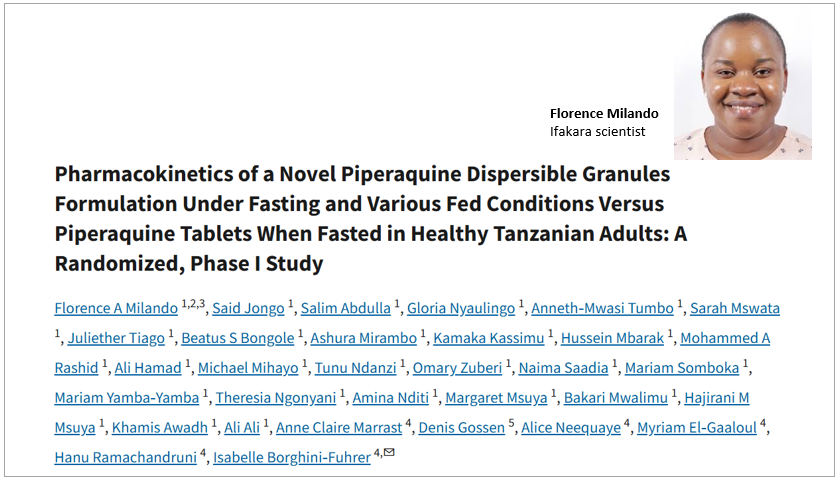
MALARIA: How food influences drug effectiveness

Can food affect how well malaria drugs work? In a recent study at Ifakara Health Institute in Bagamoyo, Tanzania, scientists found that food influences how well the antimalaria drug, known as piperaquine tetraphosphate (PQP), is absorbed in the body.
The study tested a newly developed formulation of PQP granules compared to the standard hard tablet formulation. In particular, researchers wanted to assess the impact of food intake on drug absorption.
Safety and drug absorption findings
The findings, published on the Clinical and Translational Science, demonstrated that both formulations were well tolerated and safe, with only one mild drug reaction (migraine) reported.
Notably, the new PQP granules resulted in lower drug levels than the hard tablet when taken on an empty stomach. However, food intake before taking the PQP granules increased drug absorption, particularly after a high-fat meal or whole milk.
About Piperaquine Tetraphosphate (PQP)
Piperaquine tetraphosphate (PQP) is an antimalarial drug approved in 2011 by the European Medicines Agency as a fixed-dose combination with dihydroartemisinin (DHA) for treating uncomplicated malaria. It works by preventing the malaria parasite’s ability to grow and reproduce in the human body.
Due to its high efficacy and long half-life, PQP offers extended protection for up to a month following the approved three-day dosing regimen, making it a promising option for malaria chemoprevention. However, because PQP is highly fat-soluble, its absorption can be significantly affected by food, leading to variations in drug levels in the bloodstream.
How was the study conducted?
The study, conducted between July 24, 2023, and January 3, 2024, involved 60 healthy African adults who were divided into five cohorts of 12 participants each. Scientists compared the new PQP granules (320 mg) to the PQP hard tablet under both fasted and fed conditions. The fed conditions included a typical East African low-fat meal, a standard high-fat meal, and 250 mL of whole milk.
“In the fasted state, the relative exposure of PQP granules versus the tablet was 73.9% for Cmax and 86.5% for AUC0‐t. Following a typical East African low‐fat meal, a standard high‐fat meal, or 250 mL whole milk, the relative exposure of PQP granules versus the fasted state was 202%, 275%, and 294% for Cmax and 164%, 184%, and 195% for AUC0‐t, respectively,” explained the scientists of the findings.
What this means
This study shows that food plays a crucial role in the formulation of PQP-based medications. Current guidelines recommend that PQP be taken on an empty stomach to prevent excessive drug exposure, which can prolong the QT interval and pose potential heart problems. However, in real-world settings, particularly in malaria-endemic regions, avoiding food before medication can be difficult.
Significance of localized clinical trials
Furthermore, the research highlights the feasibility of conducting early-phase clinical trials within the communities where these drugs will be utilized. By including locally relevant diets, the study offers real-world insights that can enhance malaria chemoprevention strategies.
“As PQP would need to be deployed as a combination therapy, the impact of any food restrictions on the dosing of the partner drug would also need to be considered. This study underlines the added value of conducting phase I studies in populations in the regions where the drugs will ultimately be used, as well as highlighting the increasing capacity of African centers to lead such trials,” noted the scientists.
Ifakara scientists lead the study
The study was conducted by Ifakara Health Institute scientists with Florence Milando as the lead author. Other contributors include Said Jongo, Salim Abdulla, Gloria Nyaulingo, Anneth-Mwasi Tumbo, Sarah Mswata, Juliether Tiago, Beatus Bongole, Ashura Mirambo, Kamaka Kassimu, Hussein Mbarak, Mohammed Rashid, Ali Hamad, Michael Mihayo, Tunu Ndanzi, Omary Zuberi, Naima Saadia, Mariam Somboka, Mariam Yamba-Yamba, Theresia Ngonyani, Amina Nditi, Margaret Msuya, Bakari Mwalimu, Hajirani Msuya, Khamis Awadh, and Ali Ali.
Collaborating with the Ifakara team were researchers Isabelle Borghini-Fuhrer (corresponding author), Anne Claire Marrast, Alice Neequaye, Myriam El-Gaaloul, and Hanu Ramachandruni from Medicines for Malaria Venture (MMV) in Switzerland, along with Denis Gossen from Mangareva SRL in Belgium.
Read the publication here.
